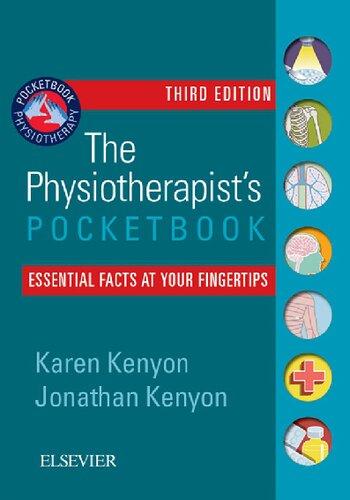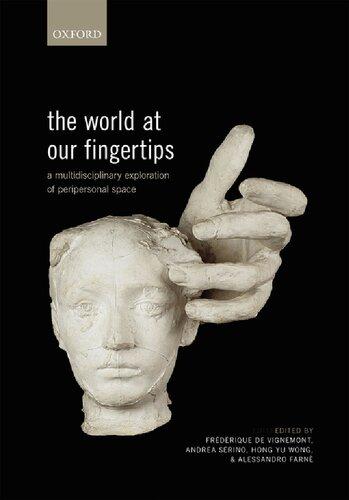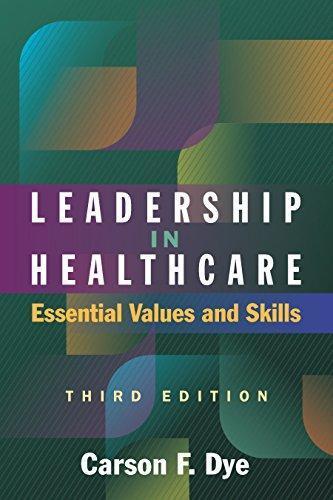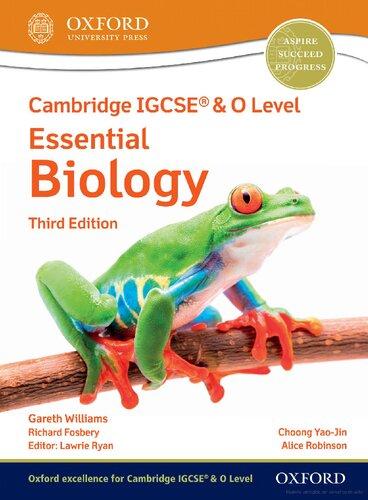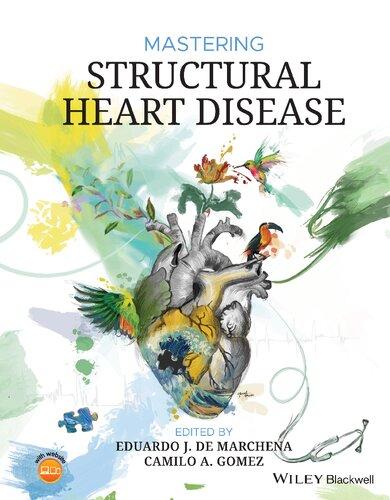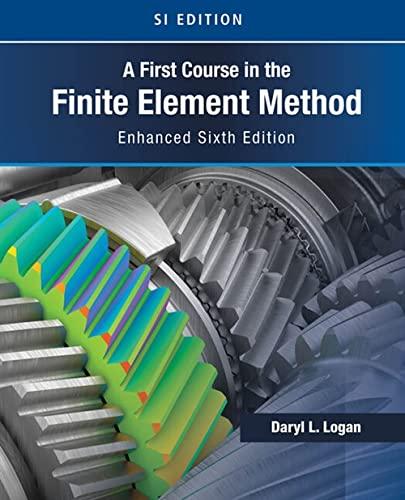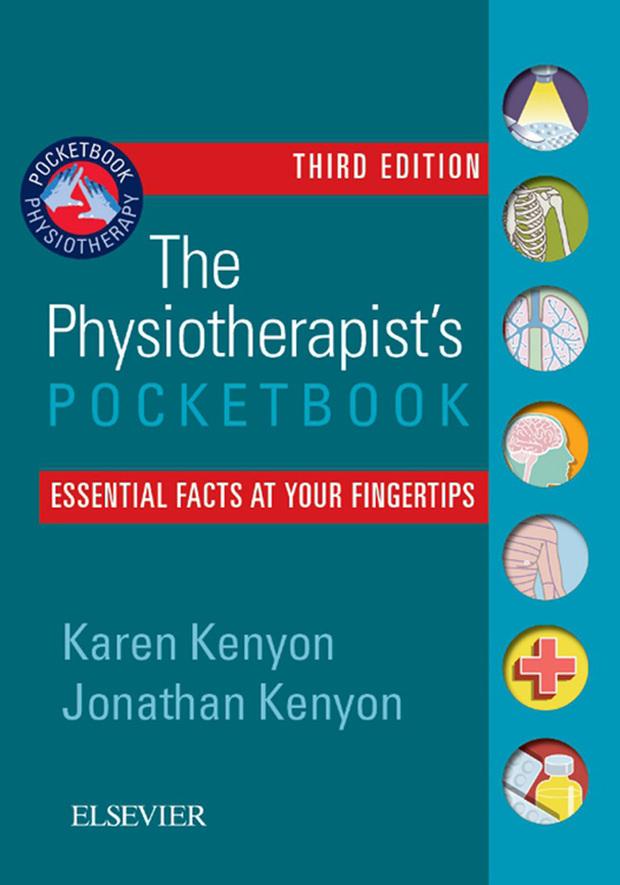https://ebookmass.com/product/the-physiotherapists-
Instant digital products (PDF, ePub, MOBI) ready for you
Download now and discover formats that fit your needs...
The
World at Our Fingertips: A Multidisciplinary Exploration of Peripersonal Space Frédérique De Vignemont
https://ebookmass.com/product/the-world-at-our-fingertips-amultidisciplinary-exploration-of-peripersonal-space-frederique-devignemont/ ebookmass.com
Leadership in Healthcare: Essential Values and Skills, Third Edition (ACHE
https://ebookmass.com/product/leadership-in-healthcare-essentialvalues-and-skills-third-edition-ache/
ebookmass.com
Cambridge IGCSE® & O Level Essential Biology: Third edition Richard Fosbery
https://ebookmass.com/product/cambridge-igcse-o-level-essentialbiology-third-edition-richard-fosbery/
ebookmass.com
Mastering Structural Heart Disease 1st Edition Eduardo J. De
Marchena
https://ebookmass.com/product/mastering-structural-heart-disease-1stedition-eduardo-j-de-marchena/
ebookmass.com
Mes trucs et astuces pour photographier comme un pro Scott
Kelby
https://ebookmass.com/product/mes-trucs-et-astuces-pour-photographiercomme-un-pro-scott-kelby/
ebookmass.com
Urban Climate Change and Heat Islands Riccardo Paolini
https://ebookmass.com/product/urban-climate-change-and-heat-islandsriccardo-paolini/
ebookmass.com
Neurology and Pregnancy: Neuro-Obstetric Disorders 1st Edition Eric A.P. Steegers (Editor)
https://ebookmass.com/product/neurology-and-pregnancy-neuro-obstetricdisorders-1st-edition-eric-a-p-steegers-editor/
ebookmass.com
Alien Bonding Anasha Vega
https://ebookmass.com/product/alien-bonding-anasha-vega/
ebookmass.com
A First Course in the Finite Element Method 6 Enhanced SI Edition Daryl L. Logan
https://ebookmass.com/product/a-first-course-in-the-finite-elementmethod-6-enhanced-si-edition-daryl-l-logan/
ebookmass.com
https://ebookmass.com/product/subtle-bodies-psycop-book-13-jordancastillo-price/
ebookmass.com
The Physiotherapist’s Pocketbook
Essential facts at your fingertips
THIRD EDITION
Karen Kenyon MRes, BSc (Hons), BA (Hons), MCSP
Sussex Partnership NHS Foundation Trust, UK
Jonathan Kenyon MSc, PGCert (NMP), BSc (Hons), MMACP, MCSP
Sussex Partnership NHS Foundation Trust, UK
© 2018 Elsevier Limited. All rights reserved.
First edition 2004
Second edition 2009
No part of this publication may be reproduced or transmitted in any form or by any means, electronic or mechanical, including photocopying, recording, or any information storage and retrieval system, without permission in writing from the publisher. Permissions may be sought directly from Elsevier’s Rights Department: phone: (+1) 215 239 3804 (US) or (+44) 1865 843830 (UK); fax: (+44) 1865 853333; e-mail: healthpermissions@elsevier.com. You may also complete your request online via the Elsevier website at http://www.elsevier.com/permissions.
ISBN 978-0-7020-5506-5 e-book 978-07020-7798-2
British Library Cataloguing in Publication Data
A catalogue record for this book is available from the British Library
Library of Congress Cataloging in Publication Data
A catalog record for this book is available from the Library of Congress
Notices
Practitioners and researchers must always rely on their own experience and knowledge in evaluating and using any information, methods, compounds or experiments described herein. Because of rapid advances in the medical sciences, in particular, independent verification of diagnoses and drug dosages should be made. To the fullest extent of the law, no responsibility is assumed by Elsevier, authors, editors or contributors for any injury and/or damage to persons or property as a matter of products liability, negligence or otherwise, or from any use or operation of any methods, products, instructions, or ideas contained in the material herein.
The Publisher
SECTION 1 Neuromusculoskeletal Anatomy 1
Musculoskeletal anatomy illustrations 2
Nerve pathways 29
Brachial plexus 45
Lumbosacral plexus 46
Peripheral nerve motor innervation 47
Muscle innervation chart 53
Muscles listed by function 59
Alphabetical listing of muscles 62
References and Further Reading 89
SECTION 2 Neuromusculoskeletal Assessment 91
Peripheral nerve sensory innervation 93
Dermatomes 95
Myotomes 96
Reflexes 96
Key features of upper and lower motor neurone lesions 98
The Medical Research Council scale for muscle power 99
Common locations for palpation of pulses 100
Common musculoskeletal tests 101
Common vascular tests 120
Neurological tests 121
Neurodynamic tests 124
Cranial nerves 132
Glossary of terms used to evaluate clinical tests 136
Common postures 138
Trigger points 145
Normal joint range of movement 157
Average range of segmental movement 159
Close packed positions and capsular patterns for selected joints 161
Classification of ligament and muscle sprains 162
Windows of achievement for gross motor developmental milestones 163
Joint hypermobility assessment 164
Complex regional pain syndrome 166
Distribution of referred pain 167
Red flags 168
Psychosocial yellow flags 170
Musculoskeletal assessment 174
References and further reading 176
SECTION 3 Neurology 179
Neuroanatomy illustrations 180
Signs and symptoms of cerebrovascular lesions 185
Signs and symptoms of injury to the lobes of the brain 189
Signs and symptoms of haemorrhage to other areas of the brain 192
Functional implications of spinal cord injury 194
Glossary of neurological terms 197
Modified Ashworth scale 202
Neurological assessment 202
References and further reading 205
SECTION 4 Respiratory 207
Respiratory anatomy illustrations 208
Respiratory volumes and capacities 212
Chest X-rays 215
Auscultation 218
Abnormal breathing patterns 220
Percussion note 221
Sputum analysis 221
Clubbing 222
Capillary refill test 224
Differential diagnosis of chest pain 224
Arterial blood gas analysis 228
Respiratory failure 230
Nasal cannula 231
Common modes of mechanical ventilation 231
Cardiorespiratory monitoring 234
ECGs 237
Biochemical and haematological studies 244
Treatment techniques 251
Tracheostomies 257
Respiratory assessment 260
References and Further Reading 263
SECTION 5 Pathology 265
Alphabetical listing of pathologies 266
Diagnostic imaging 306
SECTION 6 Pharmacology 311
Drug classes 312
Prescription abbreviations 354
Further Reading 355
SECTION 7 Appendices 357
APPENDIX 1 359
Laboratory values 359
Conversions and units 361
APPENDIX 2 365
Acronyms and Abbreviations 365
Prefixes and suffixes 378
APPENDIX 3 383
National Early Warning Score (NEWS2) for the acutely ill or deteriorating patient 383
Clinical response to the NEWS2 trigger thresholds 385
APPENDIX 4 387
Adult Basic Life Support Sequence 387
Paediatric Basic Life Support Algorithm 388
Index 389
This page intentionally left blank
Eighteen years ago we were newly qualified physiotherapists working in busy London teaching hospitals when we came up with an idea that would later become The Physiotherapist’s Pocketbook. Like hundreds of physiotherapists before us, we prepared for clinical placements and rotations by compiling pocket-sized reference notes that we could access quickly and easily when we needed to check something. As we made our way through our rotations these “crib sheets” slowly grew into a compendium of key information covering all the core areas of physiotherapy, forming the basis of the Pocketbook.
When we first wrote the Pocketbook we never thought we would be writing the third edition 14 years later. We have been overwhelmed by the favourable response to the previous two editions and have endeavoured to ensure this new edition provides a relevant and up-to-date resource that is as comprehensive and useful as possible to all clinicians. It is beyond the scope and size of the book to cover the more specialist areas of physiotherapy, but we hope that its sections on anatomy, neuromusculoskeletal examination, neurology, respiratory, pharmacology and pathology and the supporting appendices are broad enough to fulfil its main purpose – to provide quick and easy access to essential clinical information during everyday clinical practice.
A project of this size would not be possible without the support of our publishing team at Elsevier who have guided us throughout the writing and production process. In addition, we have been fortunate to work alongside a large number of colleagues, students and academics who have provided invaluable encouragement and advice. If we could name them all this would definitely not be a pocket-sized book, but we would like to say a special thanks to all our colleagues and friends at East Sussex Healthcare NHS Trust, Brighton and Sussex Hospital NHS Trust and The Sussex Musculoskeletal Partnership (Central and East).
This page intentionally left blank
This book is dedicated to our wonderful children, Jack and Eva, who have had to put up with more “physio stuff” than any child should ever be subjected to.
This page intentionally left blank
Neuromusculoskeletal anatomy
Musculoskeletal anatomy illustrations 2
Nerve pathways 29
Brachial plexus 45
Lumbosacral plexus 46
Peripheral nerve motor innervation 47
Muscle innervation chart 53
Muscles listed by function 59
Alphabetical listing of muscles 62
References and Further Reading 89
Musculoskeletal anatomy illustrations
Cephalic
Superior
Inferior
Lateral
Medial
Dorsum of foot
Caudad
Plantar surface of foot
Sagittal (median) plane
Coronal (frontal) plane
Transverse (horizontal) plane
Anterior
Posterior
Dorsum of hand
Palmar surface of hand
Proximal
Distal
Figure 1.1 Anatomical position showing cardinal planes and directional terminology.
Longus colli, upper oblique part
Longus colli vertical part
Longus colli lower oblique part
Scalenus medius
Scalenus posterior
Serratus anterior
Rectus capitis anterior
Longus capitis
Rectus capitis lateralis
Splenius capitis
Transverse process of atlas
Levator scapulae
Scalenus medius
Scalenus posterior
Scalenus anterior 1st rib
Figure 1.2 Anterior and lateral muscles of the neck.
Ligamentum nuchae
Rectus capitis posterior minor
Rectus capitis posterior major
Spinous process of C2
Semispinalis capitis
Splenius capitis
Semispinalis capitis
Vertebral artery
Splenius capitis
Obliquus capitis superior
Obliquus capitis inferior
Semispinalis cervicis
Longissimus capitis
Figure 1.3 Posterior and lateral muscles of the neck.
Levatores costarum breves
External intercostal
Quadratus lumborum
Transversus, origin from thoracolumbar fascia
Lateral intertransverse muscle
Multifidus
Figure 1.4 Deep muscles of the back.
Spinalis thoracis
Iliocostalis thoracis
Longissimus thoracis
Iliocostalis lumborum
Quadratus lumborum
Erector spinae
Semispinalis capitis
Sternocleidomastoid
Trapezius
Deltoid
Latissimus dorsi
Thoracolumbar fascia
Obliquus internus
Obliquus externus
Fascia covering gluteus medius
Fascia covering gluteus maximus
Splenis capitis
Levator scapulae
Rhomboideus minor
Supraspinatus
Infraspinatus
Teres minor
Teres major
Rhomboideus major
Serratus anterior
Serratus posterior inferior
Obliquus internus
Erector spinae
Gluteus maximus
Figure 1.5 Superficial muscles of the back, neck and trunk.
Latissimus dorsi
Digitations of serratus anterior
Intercostal internus of 10th intercostal space
Figure 1.6 Muscles of the right side of the trunk.
Rectus abdominis
Obliquus internus
Sternocostal part of pectoralis major
Clavicular part of pectoralis major
Costo-abdominal part of pectoralis major
Deltoid
Serratus anterior
Latissimus dorsi
Coracobrachialis
Biceps
Brachialis
Triceps
Triceps (long head)
Triceps (medial head)
Brachioradialis
Figure 1.7 Superficial muscles of the anterior chest and arm. Left side.
Pectoralis minor
Subclavius
Subscapularis
Long head of biceps
Short head of biceps
Coracobrachialis
Latissimus dorsi
Teres major
Serratus anterior
Biceps
Brachialis
Figure 1.8 Deep muscles of the anterior chest and upper arm. Left side.
Greater tuberosity
Humerus
Long head of triceps
Lateral head of triceps
Teres minor
Supraspinatus
Deltoid (cut)
Spine of scapula
Quadrangular space
Triangular space
Infraspinatus
Teres major
Latissimus dorsi
Figure 1.9 Muscles of the posterior scapula and upper arm. Left side.
Olecranon
Medial intermuscular septum of arm
Flexor carpi radialis
Palmaris longus
Flexor carpi ulnaris
Flexor digitorum superficialis
Tendon to ring finger
Pisiform
Flexor retinaculum
Palmar brevis
Palmar aponeurosis
Bicipital aponeurosis
Pronator teres
Brachioradialis
Flexor digitorum superficialis, radial head
Flexor pollicis longus
Flexor pollicis brevis
Abductor pollicis brevis
Adductor pollicis, transverse head
Second lumbrical
Figure 1.10 Superficial flexors of the left forearm.
Triceps
Fascia from triceps
Olecranon
Anconeus
Flexor carpi ulnaris
Extensor carpi ulnaris
Extensor digiti minimi
Radius
Extensor retinaculum
Extensor carpi ulnaris
Extensor digiti minimi
Abductor digiti minimi
Brachialis
Brachioradialis
Extensor carpi radialis brevis
Extensor digitorum
Extensor carpi radialis longus
Abductor pollicis longus
Extensor pollicis brevis
Extensor pollicis longus
Extensor carpi radialis longus and brevis
First dorsal interosseus
Figure 1.11 Superficial extensors of the right forearm.
Iliacus
Tensor
fasciae latae
Psoas major
Sartorius
Rectus femoris
Vastus lateralis
Iliotibial tract
Pectineus
Adductor longus
Gracilis
Adductor magnus
Vastus medialis
Ligamentum patellae
Tendon of sartorius
Figure 1.12 Superficial muscles of the anterior right thigh.

